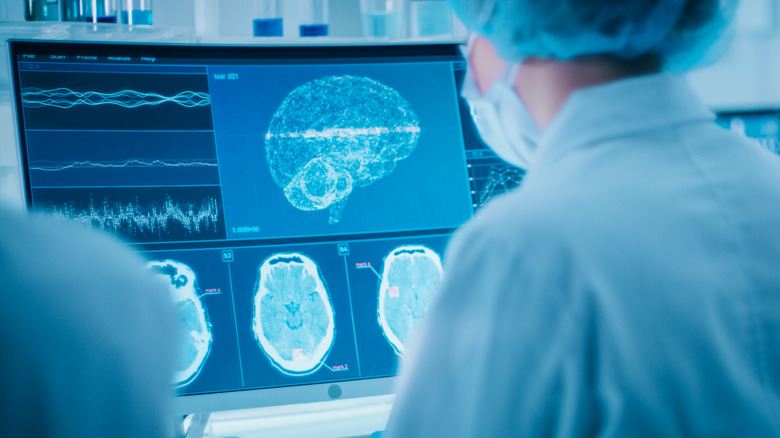Can Someone Stay Conscious Even After Death?
What happens to us after death? While there's not much definitive evidence on the subject, research appears to be slowly providing us with more answers to these big questions.
Medically, death is defined as the point in time when your vital organs cease functioning and are no longer able to support life (via Cleveland Clinic). The brain, heart, kidneys, and all other organ systems come to a stop. In the moments following death, our muscles release, our body temperature begins to fall, and our reflexes cease to respond.
There is some evidence to suggest that brain activity may linger for a little while following death. However, experts point out that this doesn't necessarily mean we are still consciously aware. Contrary to this belief however, a small 2023 study published in the Proceedings of the National Academy of Science suggests the possibility that brain activity resembling consciousness may still occur after we have died.
Brain activity following death
Researchers from the University of Michigan set out to expand on previously-existing animal research from nearly a decade ago in their small follow-up study. The study team looked at brain activity in four deceased patients who had died of cardiac arrest while hospitalized. All patients were comatose and unresponsive and ventilator support was removed, as decided upon by the patients' families.
As ventilator support was withdrawn, the researchers observed a boost in two of the patient's heart rates and consciousness-related brain waves. The brain region in which the activity was detected has previously been correlated with dreaming and altered states of consciousness. However, the study team emphasized that no definitive (or even correlational) statements can be made regarding consciousness after death as a result of the study, as more extensive research is still needed.
Even so, the study findings may have begun to shed some light on the subject. "If you talk about the dying process, there is very little we know," Jimo Borjigin, the leader of the study, told Livescience. "This is maybe the first study to really show second-by-second how the brain dies."
Consciousness in near-death experiences
While this study may be a milestone on the path to a greater understanding of what happens to the mind and body when we pass away, this is not the first time that post-mortem consciousness has been discussed among the medical community.
In 2022, Dr. Sam Parnia, director of the Cardiopulmonary Resuscitation Research Program at NYU Langone, and a team of experts published a set of research guidelines based off of numerous studies regarding death and patient near-death experiences. The research was published in the Annals of the New York Academy of Sciences.
The study team highlighted the overlap observed in patient near-death experiences across numerous studies. Such common experiences included out-of-body sensations, an expanded sense of consciousness, a meaningful review of life lived, and more, before returning to life (via NYU Langone Health). Similar to the 2023 study, Dr. Parnia and the research team explained that the presence of brain activity following death potentially lends further evidence to these patient claims, referencing how brain cells can take hours to die off following death. While we can't say for sure whether consciousness remains after death, researchers continue to explore these possibilities.



